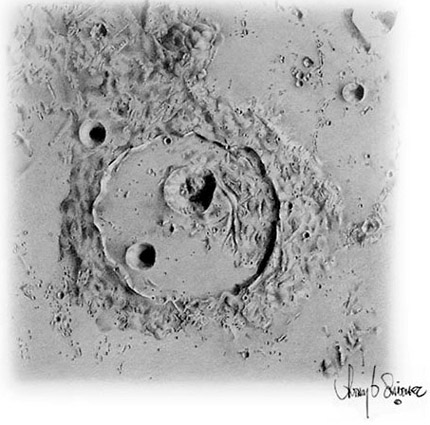Difference between revisions of "June 25, 2004"
| Line 14: | Line 14: | ||
<table width="100%" border="0" cellpadding="8"> | <table width="100%" border="0" cellpadding="8"> | ||
<tr> | <tr> | ||
| − | <td><div align="center" span class="main_sm">Image Credit: [mailto:anthony.sanchez3@comcast.net | + | <td><div align="center" span class="main_sm">Image Credit: [mailto:anthony.sanchez3@comcast.net Anthony G. Sanchez]</div></td> |
</tr> | </tr> | ||
</table> | </table> | ||
| Line 23: | Line 23: | ||
drawing is that the photo is an instantaneous record (with various distortions introduced by seeing, telescope, camera and processing), while the drawing is an interpretation based upon integration of multiple sources | drawing is that the photo is an instantaneous record (with various distortions introduced by seeing, telescope, camera and processing), while the drawing is an interpretation based upon integration of multiple sources | ||
including photographs and visual observations. The drawing also removes the scan lines in the main source (the Lunar Orbiter IV image linked below). But all drawings are subjective - although the techniques developed by the USGS reduced that risk. So if I wanted an unadulterated record of a lunar feature, especially if a transient phenomena had occurred, I'd insist on an image. But if I wanted an overall accurate and pleasing personal interpretation I'd take Anthony's drawing! | including photographs and visual observations. The drawing also removes the scan lines in the main source (the Lunar Orbiter IV image linked below). But all drawings are subjective - although the techniques developed by the USGS reduced that risk. So if I wanted an unadulterated record of a lunar feature, especially if a transient phenomena had occurred, I'd insist on an image. But if I wanted an overall accurate and pleasing personal interpretation I'd take Anthony's drawing! | ||
| − | <p class="story" align="right"> — [mailto:tychocrater@yahoo.com Chuck Wood] | + | <p class="story" align="right"> — [mailto:tychocrater@yahoo.com Chuck Wood] </p> |
| − | </p> | ||
<p class="story" align="left"><b>Technical Details:</b><br> | <p class="story" align="left"><b>Technical Details:</b><br> | ||
[http://photos.groups.yahoo.com/group/lunar-observing/lst?.dir=/Anthony+G.+Sanchez/drawing+demo&.src=gr&.order=&.view=t&.done=http%3a//briefcase.yahoo.com/ Anthony's drawing techniques] (you must join the Lunar-Observers list - easy - to see these images).</p> | [http://photos.groups.yahoo.com/group/lunar-observing/lst?.dir=/Anthony+G.+Sanchez/drawing+demo&.src=gr&.order=&.view=t&.done=http%3a//briefcase.yahoo.com/ Anthony's drawing techniques] (you must join the Lunar-Observers list - easy - to see these images).</p> | ||
Revision as of 18:20, 11 January 2015
Cassini Observed
Image Credit: Anthony G. Sanchez |
|
Cassini Observed Superb artistic skill and scientific insight infuse Anthony Sanchez's drawings of the lunar surface. As an experienced airbrush illustrator who worked at the Office of Lunar and Planetary Cartography of the US Geological Survey in Flagstaff, Az, Anthony was responsible for some of the fantastic airbrush drawings the Survey made of the surface of Mars. The difference between a photograph/image and Anthony's drawing is that the photo is an instantaneous record (with various distortions introduced by seeing, telescope, camera and processing), while the drawing is an interpretation based upon integration of multiple sources including photographs and visual observations. The drawing also removes the scan lines in the main source (the Lunar Orbiter IV image linked below). But all drawings are subjective - although the techniques developed by the USGS reduced that risk. So if I wanted an unadulterated record of a lunar feature, especially if a transient phenomena had occurred, I'd insist on an image. But if I wanted an overall accurate and pleasing personal interpretation I'd take Anthony's drawing! Technical Details: Related Links: Tomorrow's LPOD: An Older Copernicus |
Author & Editor: Technical Consultant: A service of: |
COMMENTS?
Register, and click on the Discussion tab at the top of the page.




